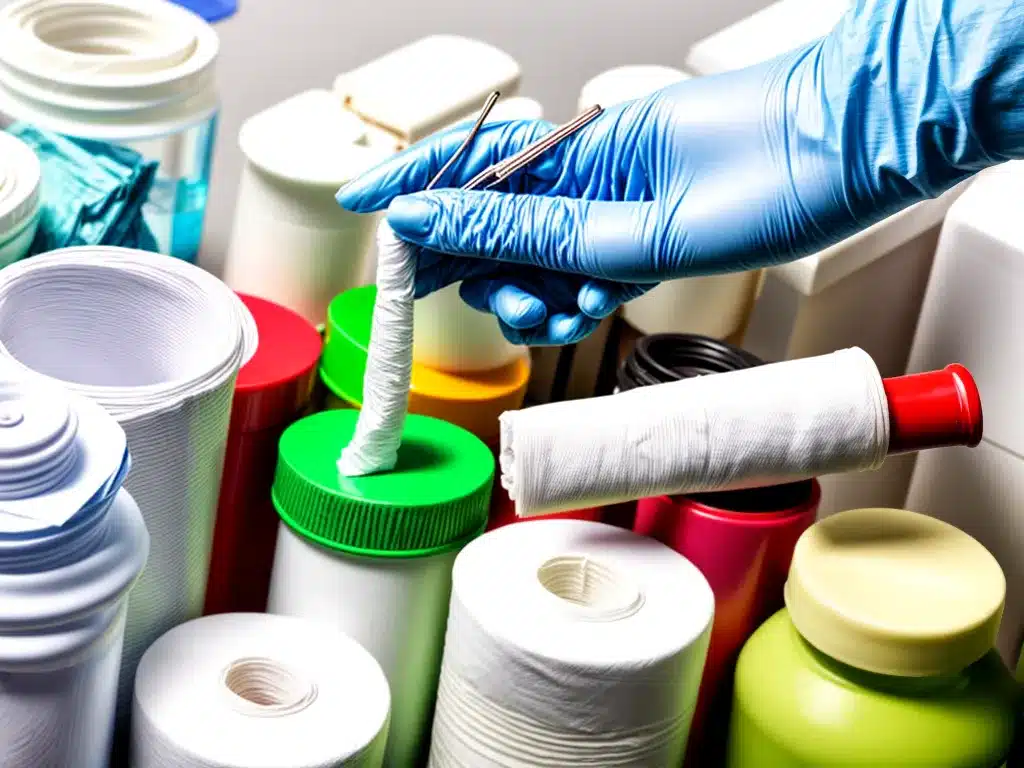Introduction
As a healthcare provider, I understand the importance of properly managing medical waste. Improper disposal of items like used bandages, syringes, and other medical materials can lead to the spread of infection and disease. That’s why I make it a priority to follow best practices for medical waste handling.
In this article, I’ll provide an in-depth look at recommended techniques for managing different types of medical waste. My goal is to share practical guidance to help other healthcare professionals keep their patients, staff, and communities safe.
Categorizing Medical Waste
The first step in safe medical waste handling is understanding the different categories of waste. This allows me to dispose of each material properly.
The main types of medical waste include:
Infectious Waste
This refers to materials contaminated with bodily fluids like blood or saliva. Examples include:
- Used bandages, gauze, and cotton balls
- Used disposable gloves
- Used syringes, needles, and lancets
Infectious waste carries pathogens that can spread disease.
Sharps
Sharps are items that can puncture or lacerate the skin. Common sharps include:
- Syringes and needles
- Scalpels and razor blades
- Broken glassware
Even if not visibly contaminated, sharps pose a physical hazard.
Pharmaceutical Waste
This category encompasses expired, unused, or contaminated drugs and vaccines. It also includes empty bottles and vials that contained medicines.
General Waste
General waste refers to non-hazardous materials that don’t fit in another category. Examples are:
- Paper towels
- Packaging
- Food waste
While general waste is not dangerous, it’s best to sort it separately from hazardous medical waste.
Handling and Disposing of Specific Waste Types
Now I’ll go over proper techniques for managing some common medical waste items.
Used Bandages
To handle used bandages safely:
- I segregate them from general waste by placing them in labeled, lined containers specifically for infectious materials.
- I avoid letting any bodily fluids leak or spill out when placing them in waste bins.
- Once containers are full, I seal and transport them for incineration or other approved disposal method for infectious waste.
Used Syringes and Needles
As sharps, used syringes, hypodermic needles, and lancets require special handling. Here is my procedure:
- I dispose of them immediately after use in puncture-proof sharps containers.
- I never try to bend, break, or recap needles.
- When sharps containers get full, I seal them and contact my medical waste vendor for pickup and proper disposal.
As an extra precaution, I try to use safety syringes and needles whenever possible. Features like retractable needles help prevent accidental sharps injuries.
Used Gloves
Because used disposable gloves may contain infectious bodily fluids, I treat them similarly to used bandages:
- I first remove gloves carefully to avoid splashes or spills.
- I put them directly in lined, leakproof containers labeled for infectious waste.
- Once full, I seal the containers and arrange for pickup by my medical waste disposal service.
For another layer of protection, I wash my hands after removing used gloves.
Expired Medications
Outdated or contaminated pharmaceuticals require special disposal too. Here are the main steps I follow:
- I sort medications carefully to identify those that are expired or unusable.
- I store expired drugs separately from usable stock in labeled containers.
- When disposing, I follow federal regulations as well as state and local requirements. Options may include incineration, authorized take-back programs, or drug disposal kits.
- For controlled substances, I document disposal and have a witness present.
Proper pharmaceutical waste disposal prevents environmental pollution and accidental poisoning.
Using Proper Protective Equipment
An important part of my medical waste procedures is wearing appropriate personal protective equipment (PPE). This helps me handle hazardous materials safely.
The PPE I use includes:
-
Gloves – I wear medical grade gloves whenever handling potentially infectious waste. I change gloves frequently to avoid cross-contamination.
-
Face and eye protection – When risks of splashing or spraying exist, I wear masks and goggles.
-
Gowns – For tasks that may produce splashes, I wear fluid-resistant gowns over my clothing.
-
Closed toe shoes – Footwear with a closed toe box provides protection in case I drop a sharp object.
I also make sure to disinfect reusable PPE like goggles and visors regularly. Following PPE best practices safeguards me and my patients.
Educating Staff
At my healthcare facility, proper waste management requires a team effort. That’s why I provide regular training to teach staff best practices for handling hazardous medical materials.
Key topics I cover include:
-
Waste segregation and packaging requirements
-
Use of PPE and other safety measures
-
Protocols for sharps disposal and injury response
-
Applicable regulations from OSHA, EPA, and other agencies
With annual refresher training, I help ensure waste management policies are implemented consistently and safely.
Conclusion
From used bandages and syringes to expired drugs, healthcare facilities generate a wide range of waste requiring safe handling. By understanding medical waste categories, following disposal best practices, using protective equipment, and educating staff, I aim to manage it responsibly. With a rigorous approach to training and compliance, I believe healthcare providers can ensure their medical waste handling helps protect public health.







